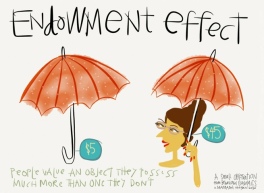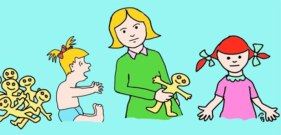I am sure many of you have come across this term somewhere, probably in the books on economics… but here’s a twist:
” Did you know this effect is “everywhere” & and it impacts us on a daily basis?”
I realized this while I was preparing for a project and came across this article a very common experience we all encounter in our lives. How often do we go shopping? And how often we buy stuff “we didn’t intend to buy then”? How many times we end up buying stuff that we know it’s overly priced YET end up buying? Sound familiar? Let me explain why and how we end up getting trapped through a simple example. It’s a nasty trick we play on ourselves. What happens when we visit a clothing store for example and get attracted to an expensive piece of clothing? In spite of the high price tag, we end up visiting the fitting room to try it on. Right? We check out ourselves in the mirror from every angle and start projecting thoughts of how we will look in a business meeting or how it will look while going on a date? What people will say? Etc. And very soon the price tag begins to get justified and we find ourselves day dreaming with a smile. This smile is proof that our brain has been hijacked!! By … the ENDOWMENT EFFECT !
The term “Endowment effect” was coined by economist Richard Thaler and later propagated by the Nobel Prize winning Psychologist and economist Daniel Kannehan. It means that people place a higher value on objects they perceive they own than objects they do not. It is somewhat linked to loss aversion theory which means that that people experience the hurt of losing something much more than the gain of acquiring it.  The Endowment effect stipulates that after people own something and after they have established or imagined a “property right” to the object then that something dramatically increases in subjective value.
The Endowment effect stipulates that after people own something and after they have established or imagined a “property right” to the object then that something dramatically increases in subjective value.
This is what happens to us in the fitting rooms! By putting on that piece of clothing we at that point endowed ourselves with the item and the thought of putting it back on the shelves gives a sense of “loosing” something which we don’t even own and suddenly we come out of the fitting room with a decision ! The decision to purchase!
Viola! “Endowment effect” in action! Lesson? “Do not enter the fitting room if you do not need it”.
We can see this endowment effect in action in many spheres of our lives. For example, real estate prices are often subject to this effect, with the sellers asking a price which exceeds consumer willingness to pay. On a smaller level, you can probably see it if you look around your house and think about the value of the items you own. For example, how much do you think the chair that you are sitting on is worth?
How often have you heard the phrase “this has sentimental value” applied to an object? This cognitive bias is also known as Divestiture Aversion (Endowment effect), referencing the idea that because people become attached to objects they own, they often develop an aversion to selling them or passing them on. One extreme example of this bias is what leads many of us to develop habit of hoarding resulting in filled to brim basements which objects we once owned but can’t let go.
Some of the extremely high starting bids on eBay auctions is another example of endowment effect in action.
This endowment effect underlies and is interspersed across the entire sales and marketing principles. Sales people are trained to “avoid the endowment effect” especially during negotiation. The lesson they are taught are “you don’t own the customer”! Thus alerting to the trap.
Price trend / price elasticity are commonly used terms in marketing which also flirt with the principle of endowment effect. The “status” brands like Channel, Louis Vuitton, Prada etc. all use endowment effect to great extent.
The one contribution that endowment effect has made to the world of economics has been a reworking of the understanding of the relationship between willingness to pay for items, and willingness to accept compensation for such items. As a general rule, people are willing to pay less for items they don’t own, and they expect more compensation to sell the items they do own & here is another twist – that “this contradicts traditional economic theory“. Go figure!
The impact of The Endowment effect to our daily lives is so great that it seems almost every aspect of our daily existence is influenced by it in one way or another, I wonder about instances where endowment effect is in action in the realm of personal relationships? If endowment effect is all about “perception of value” applied to an inanimate object, can this “perception” be applied to what we value the most in our lives – RELATIONSHIPS?
Doesn’t the endowment effect reflect the “it is mine” thought process? If so then, isn’t the “mine concept” the crux of all relationships? My Family, My GF/BF, My Wife, My Children, My Friend … etc. etc.  Isn’t it that we place tremendous value on all “My” relationships and not so much “not my” relationships? If so then is this “the endowment effect” in action?
Isn’t it that we place tremendous value on all “My” relationships and not so much “not my” relationships? If so then is this “the endowment effect” in action?
We commonly hear phrases especially in a love/hate relationships like “he is so possessive… “, “She is obsessed with him..” etc. . Are such feelings of possessiveness or obsession result of “the endowment effect”? If so, does this affect us in such a way that we end up treating our loved ones as “objects”? Hence such feelings?
Are relationships susceptible to the “the claim of ownership”?
The results of this effect can sometimes be quite interesting, and being aware of it can be very important whether you are buying or selling something or in a relationship.
As I continue to ponder & before the endowment effect hijacks my brain, I leave you with another mega twist question-
“Is Marriage, the ultimate expression of commitment spawned by “THE ENDOWMENT EFFECT”??
I hope you liked this twist, please feel free to add your twists , post comments / share your thoughts… 🙂

I appreciate you sharing this article.Thanks Again. Really Cool. ebakbbgfdeed
This is really attentiongrabbing, You’re a very professional blogger. I have joined your rss feed and sit up for in search of extra of your fantastic post. Also, I have shared your site in my social networks! addbcbabcebe